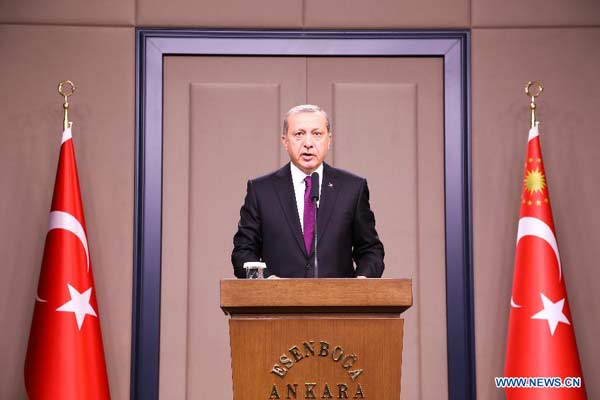 |
|
Turkish President Recep Tayyip Erdogan speaks during a press conference before departing for Beijing in Ankara Esenboga Airport, Turkey, July 28, 2015. [Photo/Xinhua] |
President Xi Jinping will attend the two-day G20 summit in Antalya, Turkey, which starts on Sunday, and many are wondering what he will do to deepen relations between the two rising regional powers.
As a bridgehead on the China-proposed Silk Road Economic Belt, which stretches northwest from China's coastal region through Central Asia and culminates in Europe, as well as a leader in the Islamic world, Turkey has a lot to offer in terms of economic, political and security cooperation with China.
Unlike some traditional European powers such as the United Kingdom, Germany and France, and Central Asian countries such as Kazakhstan and Turkmenistan, Turkey has limited economic complementarity with China. It has neither the cutting-edge technologies nor natural resources like oil and gas that China needs to upgrade its economic structure.
In fact, the economic similarities between the two countries, especially in the labor-intensive manufacturing industries such as construction and textiles which are Turkey's industrial pillars-have prevented bilateral trade from booming, and led to notable trade deficit with China.
But thanks to deepening political mutual trust, both governments have sought to change the nature of and optimize their economic engagements. Turkey has opened its door wider to Chinese tourists by simplifying the visa application process in order to increase its tourism revenue. Beijing, on its part, is working closely with Ankara to enter the Middle East market and asking its major State-owned infrastructure enterprises to help boost Turkey's infrastructure development.
China and Turkey remained relative strangers even after Beijing launched its reform and opening-up, aimed mainly at the advanced European economies and the US, more than three decades ago. Being two ancient civilizations with cultural histories and rising G20 players, both were also somewhat confused and ambitious about their roles in global governance, which some Western vested interest groups exploited for their own benefits.
The efforts of the West to check the rise of China and Turkey in recent years left them with no option but to change their strategies. China initiated the Silk Road Economic Belt and the 21st Century Maritime Silk Road projects two years ago, and Turkey began to turn to the East following several failed attempts to join the European Union.
In their shared pursuit of a fairer and more inclusive global order, China and Turkey are expected to deepen their cooperation, particularly in security, because they could end up in cut-throat competition in Central Asia from where China gets a considerable amount of its energy resources and where Turkey has a special presence.
It was disturbing to hear some people in Turkey sympathizing with the religious extremists in the Northwest China's Xinjiang Uygur autonomous region, and it left a ticking time bomb in China's security sector.
But that is no longer the case because the Turkish government is changing its ambiguous stance on extremists and intensifying measures to fight them after the country felt the impact of separatism and religious extremism.
Beijing and Ankara have reached a series of agreements on security, laying a solid foundation for security cooperation. This should deepen at the meeting between President Xi and his Turkish counterpart Recep Tayyip Erdogan.
The author is an associate professor at the University of International Relations in Beijing, and a research fellow at the Center for China and Globalization.

I’ve lived in China for quite a considerable time including my graduate school years, travelled and worked in a few cities and still choose my destination taking into consideration the density of smog or PM2.5 particulate matter in the region.